Operations and Project Management: Principles, PLC, and Case Studies
VerifiedAdded on 2021/02/21
|16
|4126
|167
Report
AI Summary
This report delves into the core concepts of operations and project management, utilizing case studies of Unilever and Sunshine Drinks Company to illustrate key principles and practices. The report begins with an introduction to these management disciplines, emphasizing their importance in achieving organizational goals. It then provides a review and critique of the implementation of operations management principles within Unilever, including an examination of Six Sigma and Lean principles. A continuous improvement plan, leveraging the PDCA framework, is proposed based on this analysis. The report further explores the application of the project life cycle (PLC), including project initiation, planning, execution, and closure, with supporting documentation. A business case for Sunshine Drinks Company's new energy drink is presented, including a cost-benefit analysis. Finally, the effectiveness of the PLC is critically evaluated using relevant theories, concepts, and models. The report concludes with recommendations for improvement and offers a comprehensive understanding of operations and project management in real-world contexts. The report is designed to provide students with a clear understanding of how to apply these principles in various business settings.
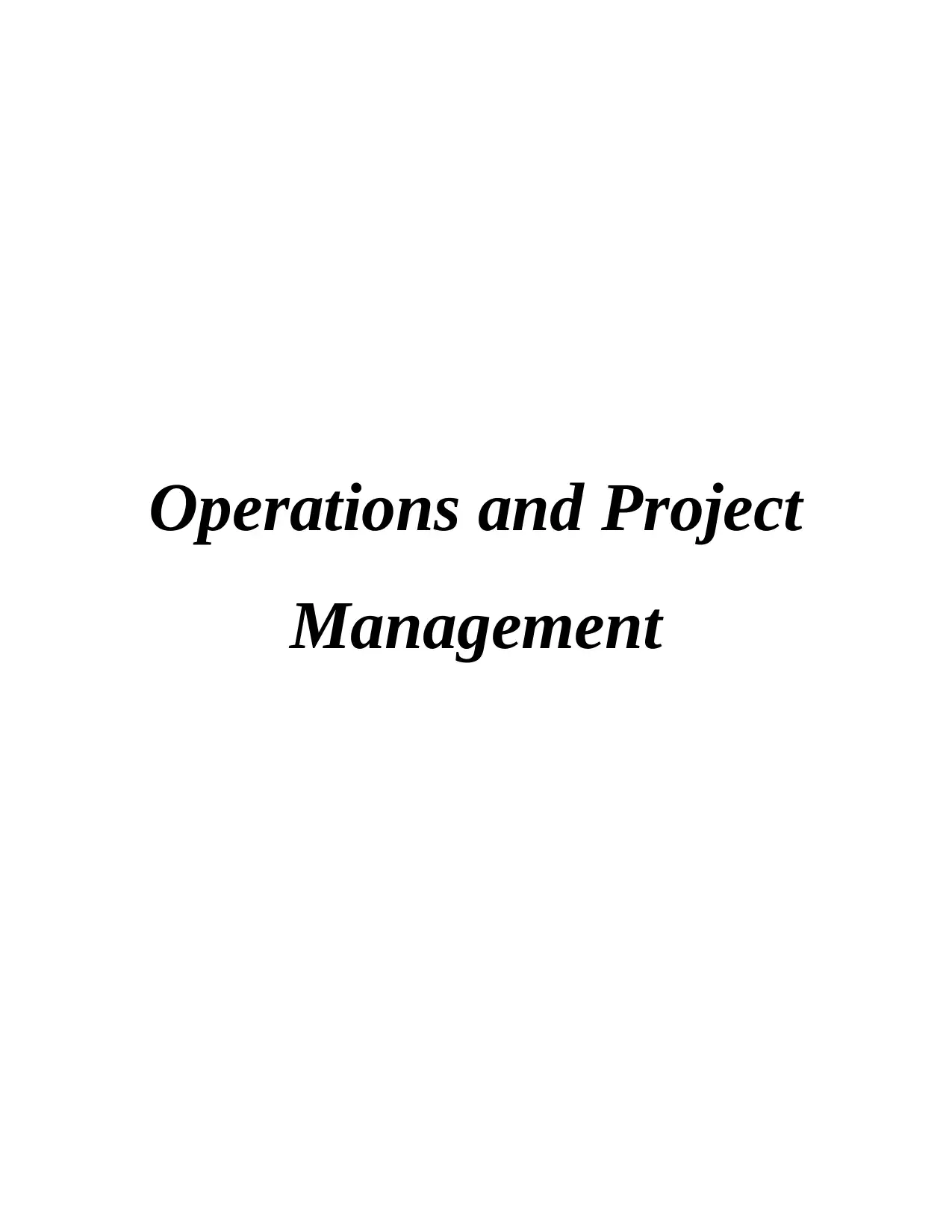
Operations and Project
Management
Management
Paraphrase This Document
Need a fresh take? Get an instant paraphrase of this document with our AI Paraphraser
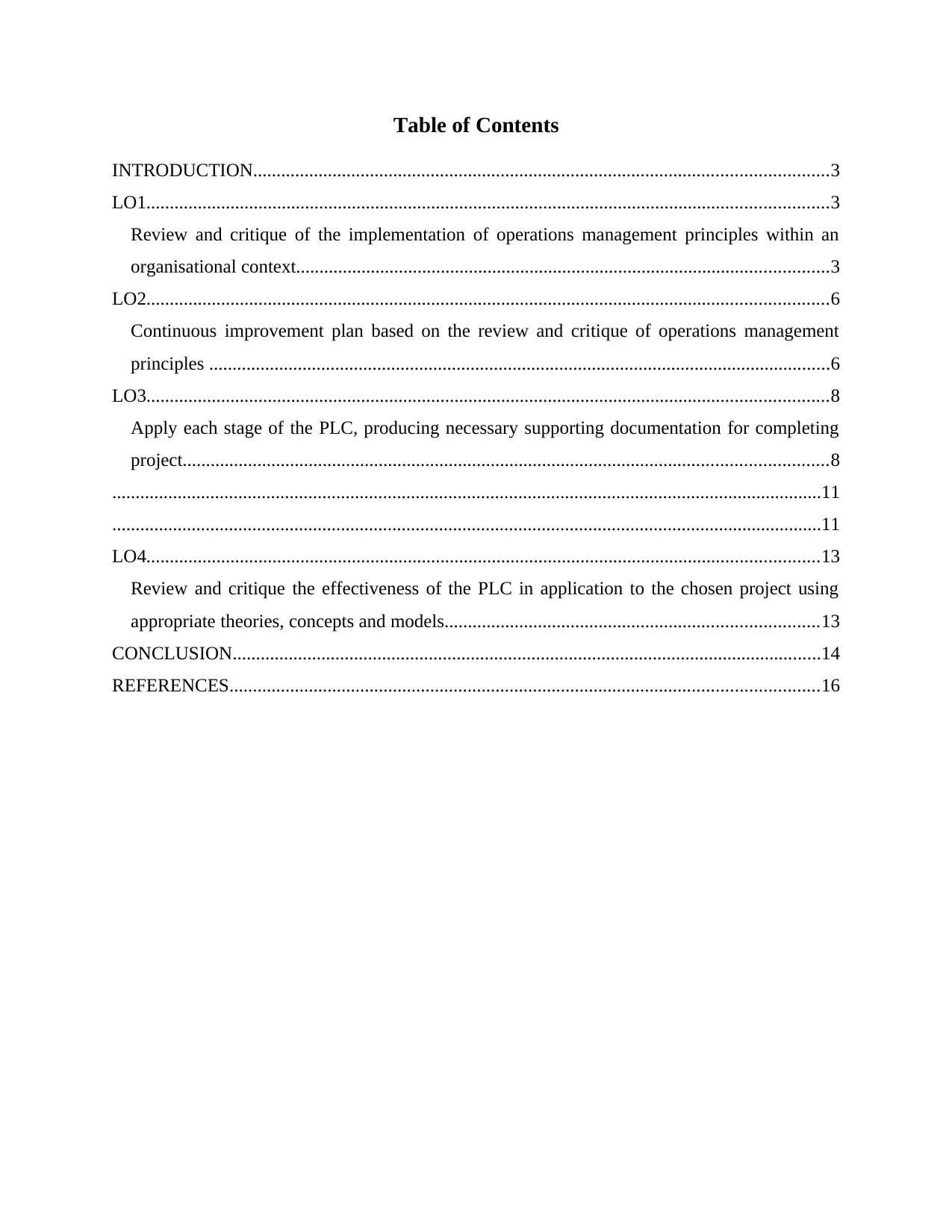
Table of Contents
INTRODUCTION...........................................................................................................................3
LO1..................................................................................................................................................3
Review and critique of the implementation of operations management principles within an
organisational context..................................................................................................................3
LO2..................................................................................................................................................6
Continuous improvement plan based on the review and critique of operations management
principles .....................................................................................................................................6
LO3..................................................................................................................................................8
Apply each stage of the PLC, producing necessary supporting documentation for completing
project..........................................................................................................................................8
........................................................................................................................................................11
........................................................................................................................................................11
LO4................................................................................................................................................13
Review and critique the effectiveness of the PLC in application to the chosen project using
appropriate theories, concepts and models................................................................................13
CONCLUSION..............................................................................................................................14
REFERENCES..............................................................................................................................16
INTRODUCTION...........................................................................................................................3
LO1..................................................................................................................................................3
Review and critique of the implementation of operations management principles within an
organisational context..................................................................................................................3
LO2..................................................................................................................................................6
Continuous improvement plan based on the review and critique of operations management
principles .....................................................................................................................................6
LO3..................................................................................................................................................8
Apply each stage of the PLC, producing necessary supporting documentation for completing
project..........................................................................................................................................8
........................................................................................................................................................11
........................................................................................................................................................11
LO4................................................................................................................................................13
Review and critique the effectiveness of the PLC in application to the chosen project using
appropriate theories, concepts and models................................................................................13
CONCLUSION..............................................................................................................................14
REFERENCES..............................................................................................................................16
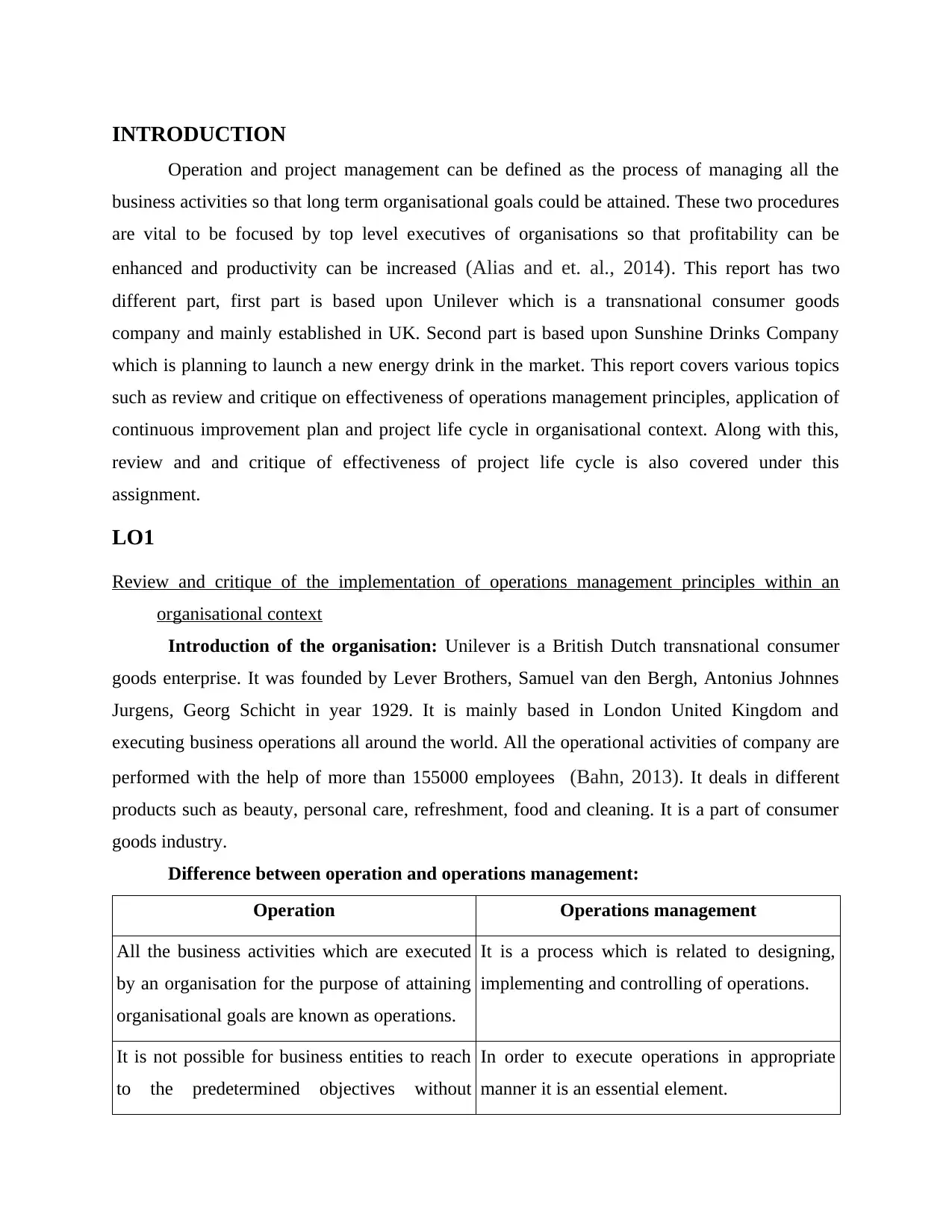
INTRODUCTION
Operation and project management can be defined as the process of managing all the
business activities so that long term organisational goals could be attained. These two procedures
are vital to be focused by top level executives of organisations so that profitability can be
enhanced and productivity can be increased (Alias and et. al., 2014). This report has two
different part, first part is based upon Unilever which is a transnational consumer goods
company and mainly established in UK. Second part is based upon Sunshine Drinks Company
which is planning to launch a new energy drink in the market. This report covers various topics
such as review and critique on effectiveness of operations management principles, application of
continuous improvement plan and project life cycle in organisational context. Along with this,
review and and critique of effectiveness of project life cycle is also covered under this
assignment.
LO1
Review and critique of the implementation of operations management principles within an
organisational context
Introduction of the organisation: Unilever is a British Dutch transnational consumer
goods enterprise. It was founded by Lever Brothers, Samuel van den Bergh, Antonius Johnnes
Jurgens, Georg Schicht in year 1929. It is mainly based in London United Kingdom and
executing business operations all around the world. All the operational activities of company are
performed with the help of more than 155000 employees (Bahn, 2013). It deals in different
products such as beauty, personal care, refreshment, food and cleaning. It is a part of consumer
goods industry.
Difference between operation and operations management:
Operation Operations management
All the business activities which are executed
by an organisation for the purpose of attaining
organisational goals are known as operations.
It is a process which is related to designing,
implementing and controlling of operations.
It is not possible for business entities to reach
to the predetermined objectives without
In order to execute operations in appropriate
manner it is an essential element.
Operation and project management can be defined as the process of managing all the
business activities so that long term organisational goals could be attained. These two procedures
are vital to be focused by top level executives of organisations so that profitability can be
enhanced and productivity can be increased (Alias and et. al., 2014). This report has two
different part, first part is based upon Unilever which is a transnational consumer goods
company and mainly established in UK. Second part is based upon Sunshine Drinks Company
which is planning to launch a new energy drink in the market. This report covers various topics
such as review and critique on effectiveness of operations management principles, application of
continuous improvement plan and project life cycle in organisational context. Along with this,
review and and critique of effectiveness of project life cycle is also covered under this
assignment.
LO1
Review and critique of the implementation of operations management principles within an
organisational context
Introduction of the organisation: Unilever is a British Dutch transnational consumer
goods enterprise. It was founded by Lever Brothers, Samuel van den Bergh, Antonius Johnnes
Jurgens, Georg Schicht in year 1929. It is mainly based in London United Kingdom and
executing business operations all around the world. All the operational activities of company are
performed with the help of more than 155000 employees (Bahn, 2013). It deals in different
products such as beauty, personal care, refreshment, food and cleaning. It is a part of consumer
goods industry.
Difference between operation and operations management:
Operation Operations management
All the business activities which are executed
by an organisation for the purpose of attaining
organisational goals are known as operations.
It is a process which is related to designing,
implementing and controlling of operations.
It is not possible for business entities to reach
to the predetermined objectives without
In order to execute operations in appropriate
manner it is an essential element.
⊘ This is a preview!⊘
Do you want full access?
Subscribe today to unlock all pages.

Trusted by 1+ million students worldwide
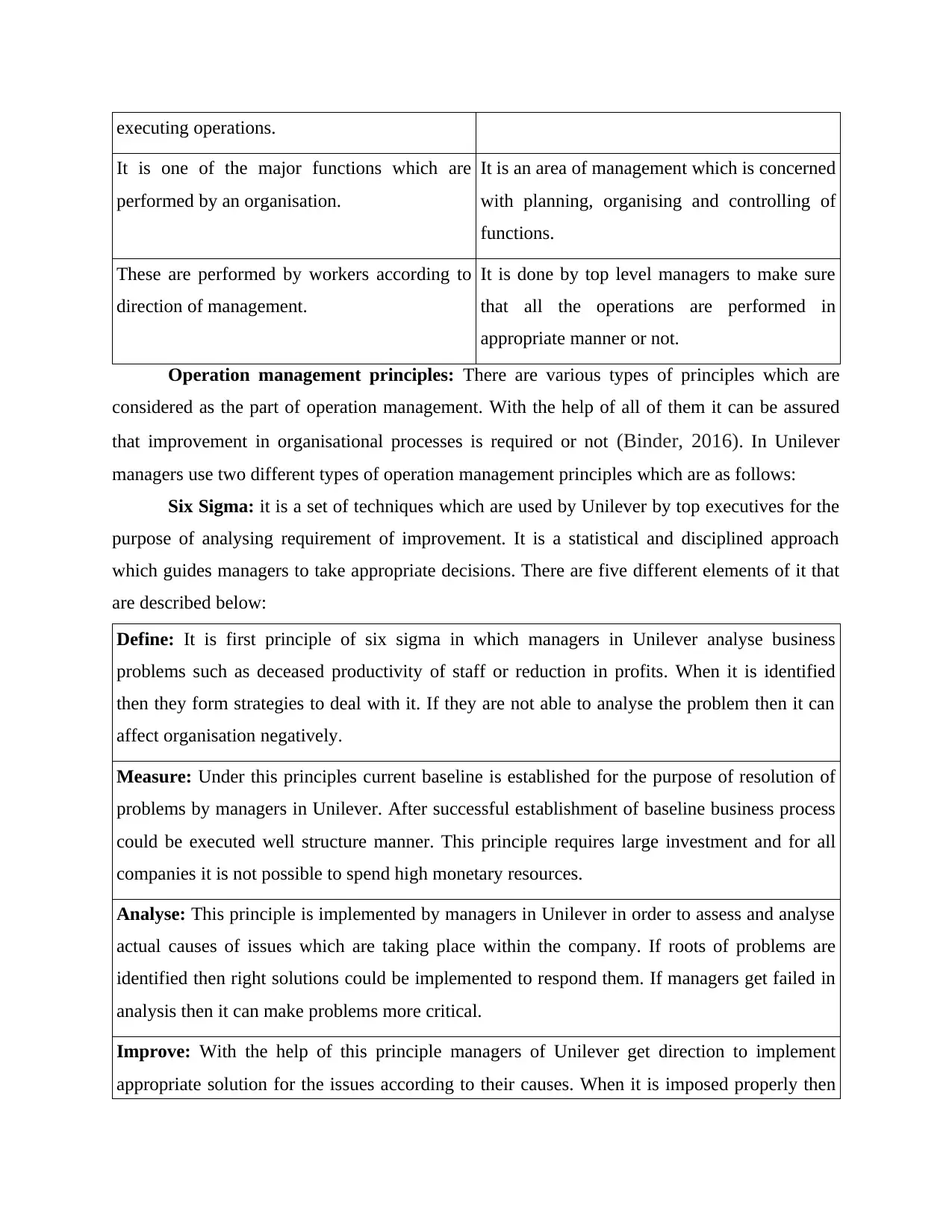
executing operations.
It is one of the major functions which are
performed by an organisation.
It is an area of management which is concerned
with planning, organising and controlling of
functions.
These are performed by workers according to
direction of management.
It is done by top level managers to make sure
that all the operations are performed in
appropriate manner or not.
Operation management principles: There are various types of principles which are
considered as the part of operation management. With the help of all of them it can be assured
that improvement in organisational processes is required or not (Binder, 2016). In Unilever
managers use two different types of operation management principles which are as follows:
Six Sigma: it is a set of techniques which are used by Unilever by top executives for the
purpose of analysing requirement of improvement. It is a statistical and disciplined approach
which guides managers to take appropriate decisions. There are five different elements of it that
are described below:
Define: It is first principle of six sigma in which managers in Unilever analyse business
problems such as deceased productivity of staff or reduction in profits. When it is identified
then they form strategies to deal with it. If they are not able to analyse the problem then it can
affect organisation negatively.
Measure: Under this principles current baseline is established for the purpose of resolution of
problems by managers in Unilever. After successful establishment of baseline business process
could be executed well structure manner. This principle requires large investment and for all
companies it is not possible to spend high monetary resources.
Analyse: This principle is implemented by managers in Unilever in order to assess and analyse
actual causes of issues which are taking place within the company. If roots of problems are
identified then right solutions could be implemented to respond them. If managers get failed in
analysis then it can make problems more critical.
Improve: With the help of this principle managers of Unilever get direction to implement
appropriate solution for the issues according to their causes. When it is imposed properly then
It is one of the major functions which are
performed by an organisation.
It is an area of management which is concerned
with planning, organising and controlling of
functions.
These are performed by workers according to
direction of management.
It is done by top level managers to make sure
that all the operations are performed in
appropriate manner or not.
Operation management principles: There are various types of principles which are
considered as the part of operation management. With the help of all of them it can be assured
that improvement in organisational processes is required or not (Binder, 2016). In Unilever
managers use two different types of operation management principles which are as follows:
Six Sigma: it is a set of techniques which are used by Unilever by top executives for the
purpose of analysing requirement of improvement. It is a statistical and disciplined approach
which guides managers to take appropriate decisions. There are five different elements of it that
are described below:
Define: It is first principle of six sigma in which managers in Unilever analyse business
problems such as deceased productivity of staff or reduction in profits. When it is identified
then they form strategies to deal with it. If they are not able to analyse the problem then it can
affect organisation negatively.
Measure: Under this principles current baseline is established for the purpose of resolution of
problems by managers in Unilever. After successful establishment of baseline business process
could be executed well structure manner. This principle requires large investment and for all
companies it is not possible to spend high monetary resources.
Analyse: This principle is implemented by managers in Unilever in order to assess and analyse
actual causes of issues which are taking place within the company. If roots of problems are
identified then right solutions could be implemented to respond them. If managers get failed in
analysis then it can make problems more critical.
Improve: With the help of this principle managers of Unilever get direction to implement
appropriate solution for the issues according to their causes. When it is imposed properly then
Paraphrase This Document
Need a fresh take? Get an instant paraphrase of this document with our AI Paraphraser
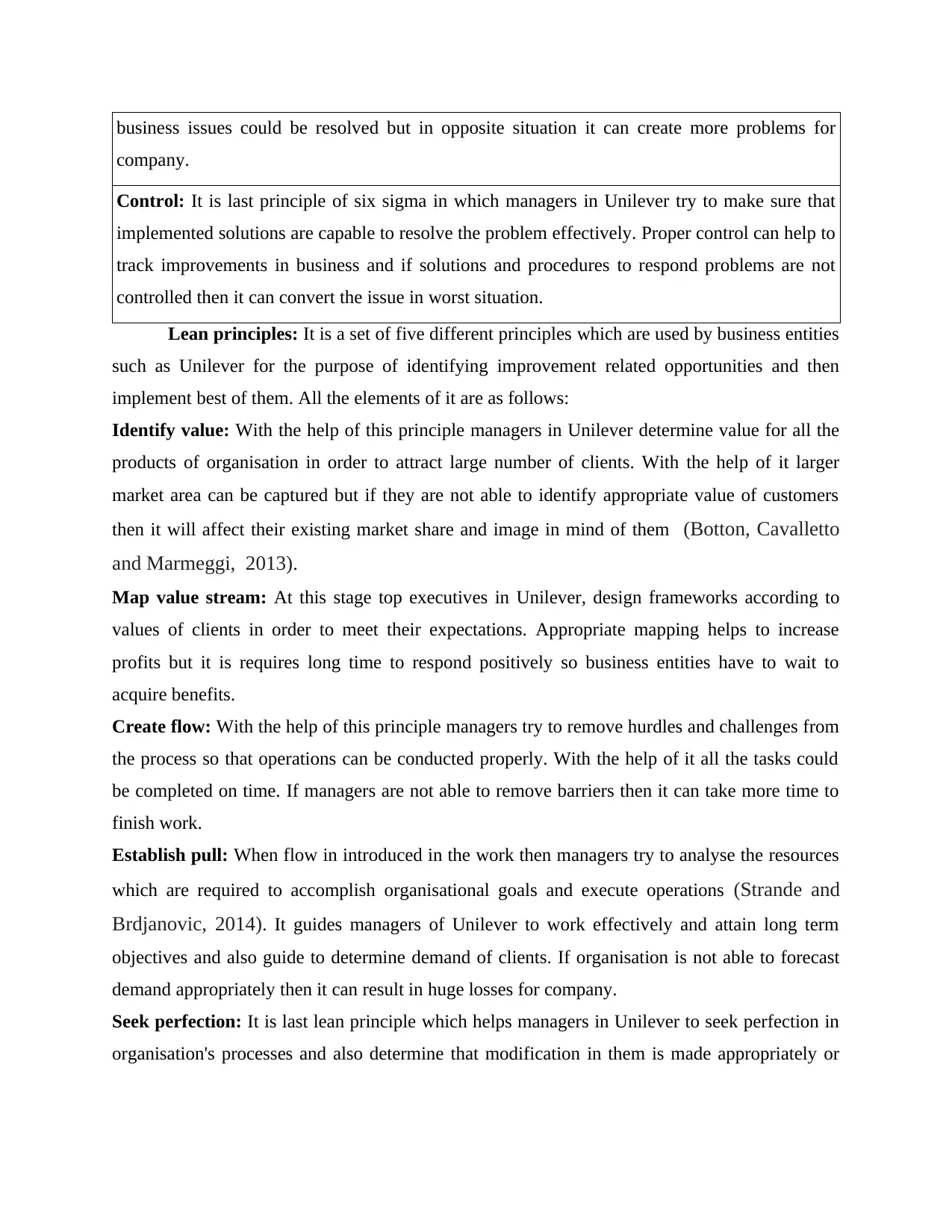
business issues could be resolved but in opposite situation it can create more problems for
company.
Control: It is last principle of six sigma in which managers in Unilever try to make sure that
implemented solutions are capable to resolve the problem effectively. Proper control can help to
track improvements in business and if solutions and procedures to respond problems are not
controlled then it can convert the issue in worst situation.
Lean principles: It is a set of five different principles which are used by business entities
such as Unilever for the purpose of identifying improvement related opportunities and then
implement best of them. All the elements of it are as follows:
Identify value: With the help of this principle managers in Unilever determine value for all the
products of organisation in order to attract large number of clients. With the help of it larger
market area can be captured but if they are not able to identify appropriate value of customers
then it will affect their existing market share and image in mind of them (Botton, Cavalletto
and Marmeggi, 2013).
Map value stream: At this stage top executives in Unilever, design frameworks according to
values of clients in order to meet their expectations. Appropriate mapping helps to increase
profits but it is requires long time to respond positively so business entities have to wait to
acquire benefits.
Create flow: With the help of this principle managers try to remove hurdles and challenges from
the process so that operations can be conducted properly. With the help of it all the tasks could
be completed on time. If managers are not able to remove barriers then it can take more time to
finish work.
Establish pull: When flow in introduced in the work then managers try to analyse the resources
which are required to accomplish organisational goals and execute operations (Strande and
Brdjanovic, 2014). It guides managers of Unilever to work effectively and attain long term
objectives and also guide to determine demand of clients. If organisation is not able to forecast
demand appropriately then it can result in huge losses for company.
Seek perfection: It is last lean principle which helps managers in Unilever to seek perfection in
organisation's processes and also determine that modification in them is made appropriately or
company.
Control: It is last principle of six sigma in which managers in Unilever try to make sure that
implemented solutions are capable to resolve the problem effectively. Proper control can help to
track improvements in business and if solutions and procedures to respond problems are not
controlled then it can convert the issue in worst situation.
Lean principles: It is a set of five different principles which are used by business entities
such as Unilever for the purpose of identifying improvement related opportunities and then
implement best of them. All the elements of it are as follows:
Identify value: With the help of this principle managers in Unilever determine value for all the
products of organisation in order to attract large number of clients. With the help of it larger
market area can be captured but if they are not able to identify appropriate value of customers
then it will affect their existing market share and image in mind of them (Botton, Cavalletto
and Marmeggi, 2013).
Map value stream: At this stage top executives in Unilever, design frameworks according to
values of clients in order to meet their expectations. Appropriate mapping helps to increase
profits but it is requires long time to respond positively so business entities have to wait to
acquire benefits.
Create flow: With the help of this principle managers try to remove hurdles and challenges from
the process so that operations can be conducted properly. With the help of it all the tasks could
be completed on time. If managers are not able to remove barriers then it can take more time to
finish work.
Establish pull: When flow in introduced in the work then managers try to analyse the resources
which are required to accomplish organisational goals and execute operations (Strande and
Brdjanovic, 2014). It guides managers of Unilever to work effectively and attain long term
objectives and also guide to determine demand of clients. If organisation is not able to forecast
demand appropriately then it can result in huge losses for company.
Seek perfection: It is last lean principle which helps managers in Unilever to seek perfection in
organisation's processes and also determine that modification in them is made appropriately or
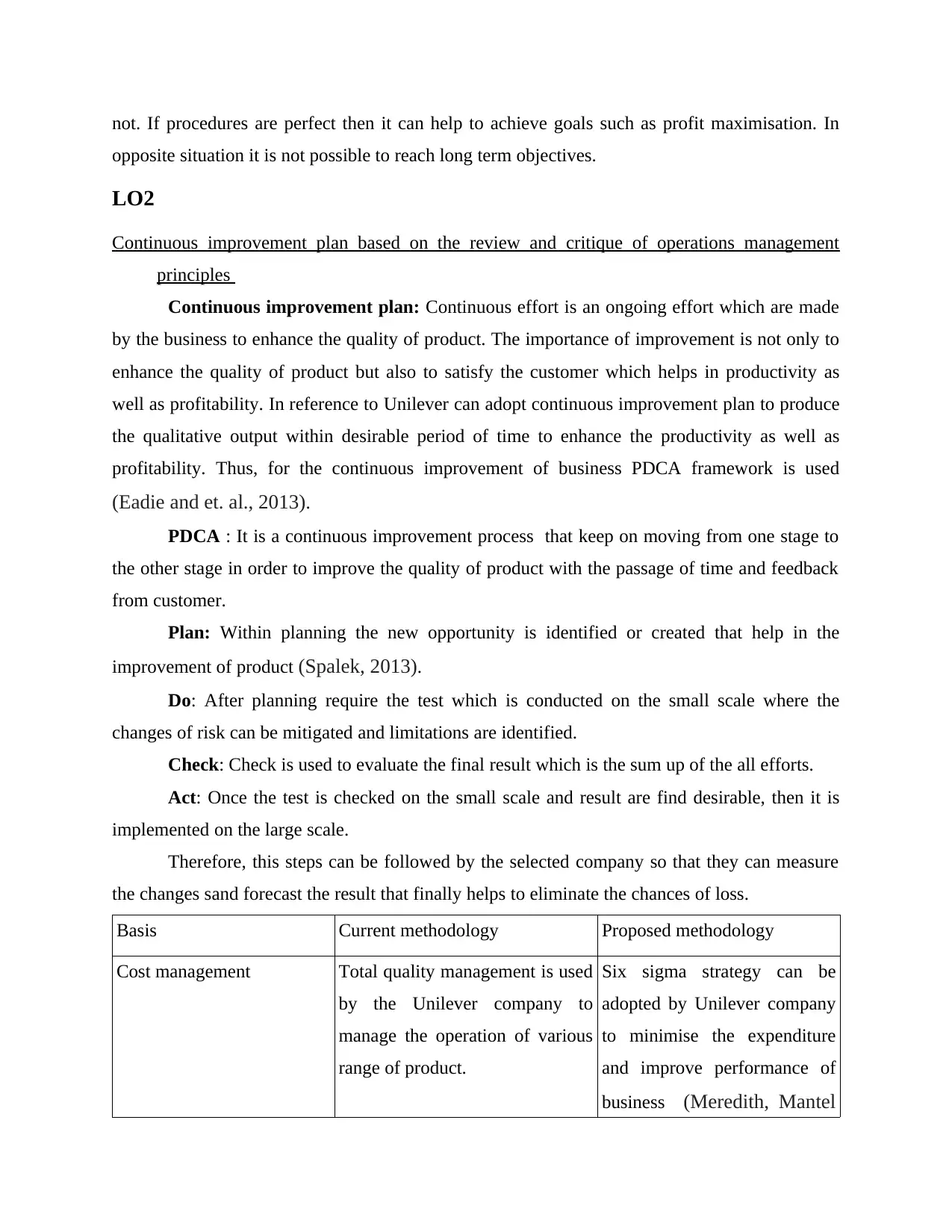
not. If procedures are perfect then it can help to achieve goals such as profit maximisation. In
opposite situation it is not possible to reach long term objectives.
LO2
Continuous improvement plan based on the review and critique of operations management
principles
Continuous improvement plan: Continuous effort is an ongoing effort which are made
by the business to enhance the quality of product. The importance of improvement is not only to
enhance the quality of product but also to satisfy the customer which helps in productivity as
well as profitability. In reference to Unilever can adopt continuous improvement plan to produce
the qualitative output within desirable period of time to enhance the productivity as well as
profitability. Thus, for the continuous improvement of business PDCA framework is used
(Eadie and et. al., 2013).
PDCA : It is a continuous improvement process that keep on moving from one stage to
the other stage in order to improve the quality of product with the passage of time and feedback
from customer.
Plan: Within planning the new opportunity is identified or created that help in the
improvement of product (Spalek, 2013).
Do: After planning require the test which is conducted on the small scale where the
changes of risk can be mitigated and limitations are identified.
Check: Check is used to evaluate the final result which is the sum up of the all efforts.
Act: Once the test is checked on the small scale and result are find desirable, then it is
implemented on the large scale.
Therefore, this steps can be followed by the selected company so that they can measure
the changes sand forecast the result that finally helps to eliminate the chances of loss.
Basis Current methodology Proposed methodology
Cost management Total quality management is used
by the Unilever company to
manage the operation of various
range of product.
Six sigma strategy can be
adopted by Unilever company
to minimise the expenditure
and improve performance of
business (Meredith, Mantel
opposite situation it is not possible to reach long term objectives.
LO2
Continuous improvement plan based on the review and critique of operations management
principles
Continuous improvement plan: Continuous effort is an ongoing effort which are made
by the business to enhance the quality of product. The importance of improvement is not only to
enhance the quality of product but also to satisfy the customer which helps in productivity as
well as profitability. In reference to Unilever can adopt continuous improvement plan to produce
the qualitative output within desirable period of time to enhance the productivity as well as
profitability. Thus, for the continuous improvement of business PDCA framework is used
(Eadie and et. al., 2013).
PDCA : It is a continuous improvement process that keep on moving from one stage to
the other stage in order to improve the quality of product with the passage of time and feedback
from customer.
Plan: Within planning the new opportunity is identified or created that help in the
improvement of product (Spalek, 2013).
Do: After planning require the test which is conducted on the small scale where the
changes of risk can be mitigated and limitations are identified.
Check: Check is used to evaluate the final result which is the sum up of the all efforts.
Act: Once the test is checked on the small scale and result are find desirable, then it is
implemented on the large scale.
Therefore, this steps can be followed by the selected company so that they can measure
the changes sand forecast the result that finally helps to eliminate the chances of loss.
Basis Current methodology Proposed methodology
Cost management Total quality management is used
by the Unilever company to
manage the operation of various
range of product.
Six sigma strategy can be
adopted by Unilever company
to minimise the expenditure
and improve performance of
business (Meredith, Mantel
⊘ This is a preview!⊘
Do you want full access?
Subscribe today to unlock all pages.

Trusted by 1+ million students worldwide
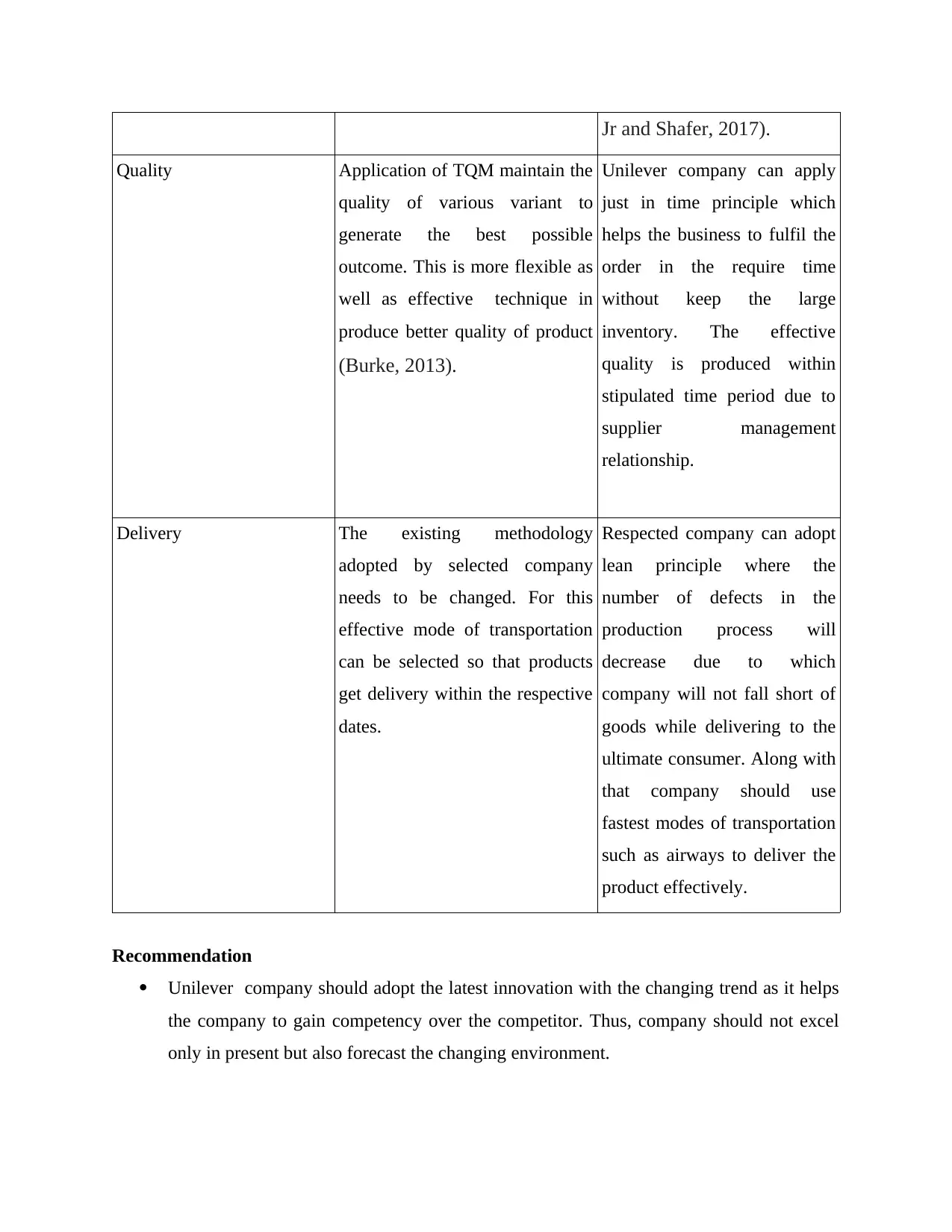
Jr and Shafer, 2017).
Quality Application of TQM maintain the
quality of various variant to
generate the best possible
outcome. This is more flexible as
well as effective technique in
produce better quality of product
(Burke, 2013).
Unilever company can apply
just in time principle which
helps the business to fulfil the
order in the require time
without keep the large
inventory. The effective
quality is produced within
stipulated time period due to
supplier management
relationship.
Delivery The existing methodology
adopted by selected company
needs to be changed. For this
effective mode of transportation
can be selected so that products
get delivery within the respective
dates.
Respected company can adopt
lean principle where the
number of defects in the
production process will
decrease due to which
company will not fall short of
goods while delivering to the
ultimate consumer. Along with
that company should use
fastest modes of transportation
such as airways to deliver the
product effectively.
Recommendation
Unilever company should adopt the latest innovation with the changing trend as it helps
the company to gain competency over the competitor. Thus, company should not excel
only in present but also forecast the changing environment.
Quality Application of TQM maintain the
quality of various variant to
generate the best possible
outcome. This is more flexible as
well as effective technique in
produce better quality of product
(Burke, 2013).
Unilever company can apply
just in time principle which
helps the business to fulfil the
order in the require time
without keep the large
inventory. The effective
quality is produced within
stipulated time period due to
supplier management
relationship.
Delivery The existing methodology
adopted by selected company
needs to be changed. For this
effective mode of transportation
can be selected so that products
get delivery within the respective
dates.
Respected company can adopt
lean principle where the
number of defects in the
production process will
decrease due to which
company will not fall short of
goods while delivering to the
ultimate consumer. Along with
that company should use
fastest modes of transportation
such as airways to deliver the
product effectively.
Recommendation
Unilever company should adopt the latest innovation with the changing trend as it helps
the company to gain competency over the competitor. Thus, company should not excel
only in present but also forecast the changing environment.
Paraphrase This Document
Need a fresh take? Get an instant paraphrase of this document with our AI Paraphraser
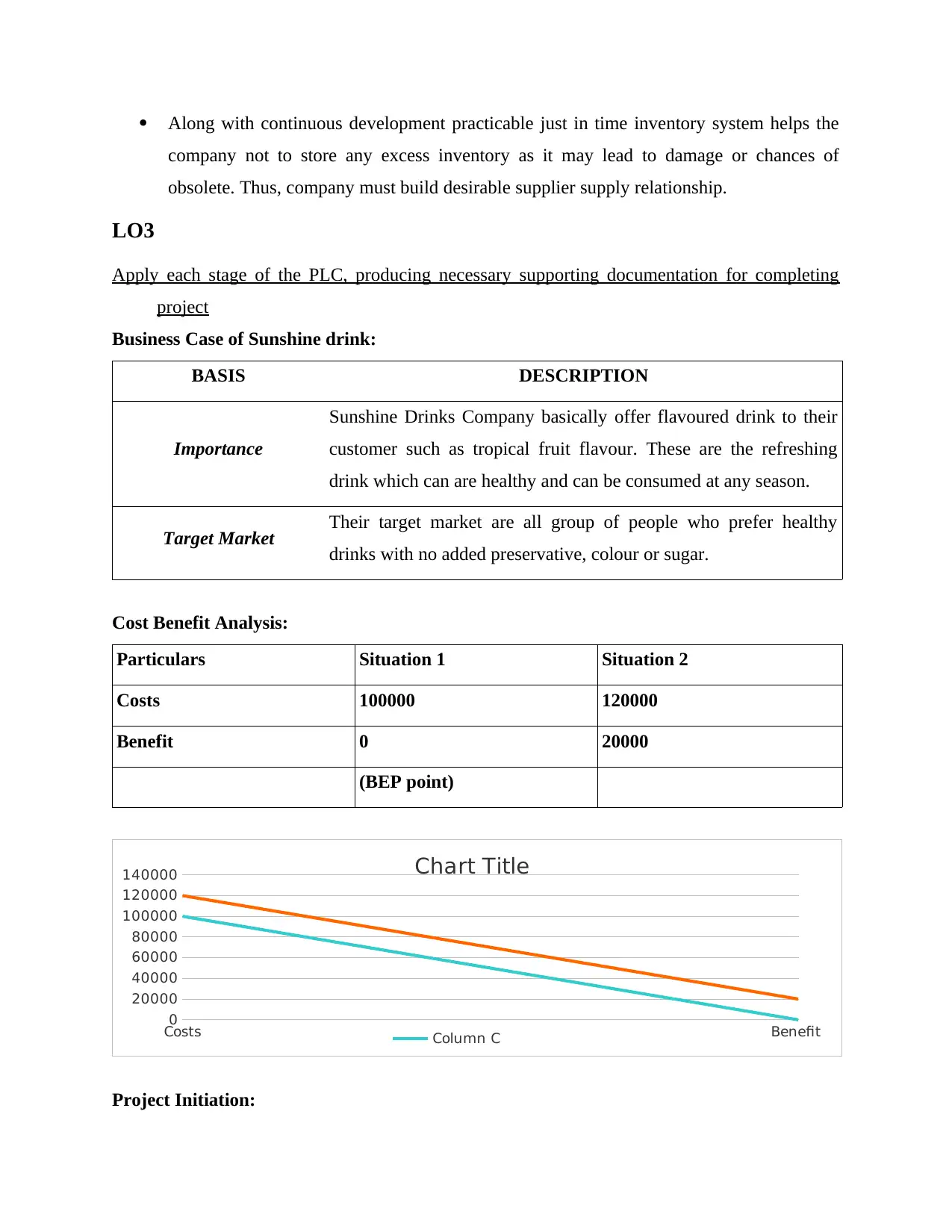
Along with continuous development practicable just in time inventory system helps the
company not to store any excess inventory as it may lead to damage or chances of
obsolete. Thus, company must build desirable supplier supply relationship.
LO3
Apply each stage of the PLC, producing necessary supporting documentation for completing
project
Business Case of Sunshine drink:
BASIS DESCRIPTION
Importance
Sunshine Drinks Company basically offer flavoured drink to their
customer such as tropical fruit flavour. These are the refreshing
drink which can are healthy and can be consumed at any season.
Target Market Their target market are all group of people who prefer healthy
drinks with no added preservative, colour or sugar.
Cost Benefit Analysis:
Particulars Situation 1 Situation 2
Costs 100000 120000
Benefit 0 20000
(BEP point)
Costs Benefit
0
20000
40000
60000
80000
100000
120000
140000 Chart Title
Column C
Project Initiation:
company not to store any excess inventory as it may lead to damage or chances of
obsolete. Thus, company must build desirable supplier supply relationship.
LO3
Apply each stage of the PLC, producing necessary supporting documentation for completing
project
Business Case of Sunshine drink:
BASIS DESCRIPTION
Importance
Sunshine Drinks Company basically offer flavoured drink to their
customer such as tropical fruit flavour. These are the refreshing
drink which can are healthy and can be consumed at any season.
Target Market Their target market are all group of people who prefer healthy
drinks with no added preservative, colour or sugar.
Cost Benefit Analysis:
Particulars Situation 1 Situation 2
Costs 100000 120000
Benefit 0 20000
(BEP point)
Costs Benefit
0
20000
40000
60000
80000
100000
120000
140000 Chart Title
Column C
Project Initiation:
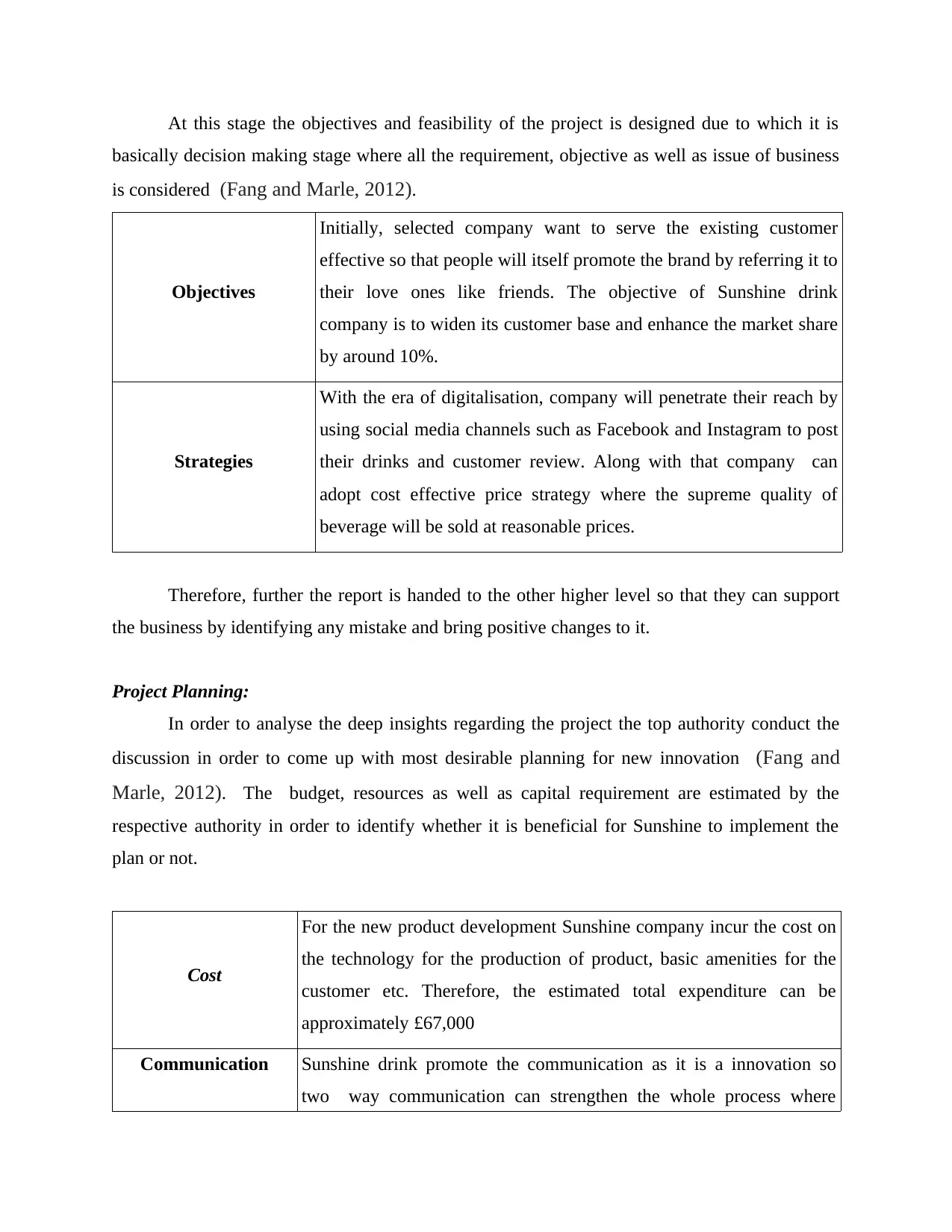
At this stage the objectives and feasibility of the project is designed due to which it is
basically decision making stage where all the requirement, objective as well as issue of business
is considered (Fang and Marle, 2012).
Objectives
Initially, selected company want to serve the existing customer
effective so that people will itself promote the brand by referring it to
their love ones like friends. The objective of Sunshine drink
company is to widen its customer base and enhance the market share
by around 10%.
Strategies
With the era of digitalisation, company will penetrate their reach by
using social media channels such as Facebook and Instagram to post
their drinks and customer review. Along with that company can
adopt cost effective price strategy where the supreme quality of
beverage will be sold at reasonable prices.
Therefore, further the report is handed to the other higher level so that they can support
the business by identifying any mistake and bring positive changes to it.
Project Planning:
In order to analyse the deep insights regarding the project the top authority conduct the
discussion in order to come up with most desirable planning for new innovation (Fang and
Marle, 2012). The budget, resources as well as capital requirement are estimated by the
respective authority in order to identify whether it is beneficial for Sunshine to implement the
plan or not.
Cost
For the new product development Sunshine company incur the cost on
the technology for the production of product, basic amenities for the
customer etc. Therefore, the estimated total expenditure can be
approximately £67,000
Communication Sunshine drink promote the communication as it is a innovation so
two way communication can strengthen the whole process where
basically decision making stage where all the requirement, objective as well as issue of business
is considered (Fang and Marle, 2012).
Objectives
Initially, selected company want to serve the existing customer
effective so that people will itself promote the brand by referring it to
their love ones like friends. The objective of Sunshine drink
company is to widen its customer base and enhance the market share
by around 10%.
Strategies
With the era of digitalisation, company will penetrate their reach by
using social media channels such as Facebook and Instagram to post
their drinks and customer review. Along with that company can
adopt cost effective price strategy where the supreme quality of
beverage will be sold at reasonable prices.
Therefore, further the report is handed to the other higher level so that they can support
the business by identifying any mistake and bring positive changes to it.
Project Planning:
In order to analyse the deep insights regarding the project the top authority conduct the
discussion in order to come up with most desirable planning for new innovation (Fang and
Marle, 2012). The budget, resources as well as capital requirement are estimated by the
respective authority in order to identify whether it is beneficial for Sunshine to implement the
plan or not.
Cost
For the new product development Sunshine company incur the cost on
the technology for the production of product, basic amenities for the
customer etc. Therefore, the estimated total expenditure can be
approximately £67,000
Communication Sunshine drink promote the communication as it is a innovation so
two way communication can strengthen the whole process where
⊘ This is a preview!⊘
Do you want full access?
Subscribe today to unlock all pages.

Trusted by 1+ million students worldwide
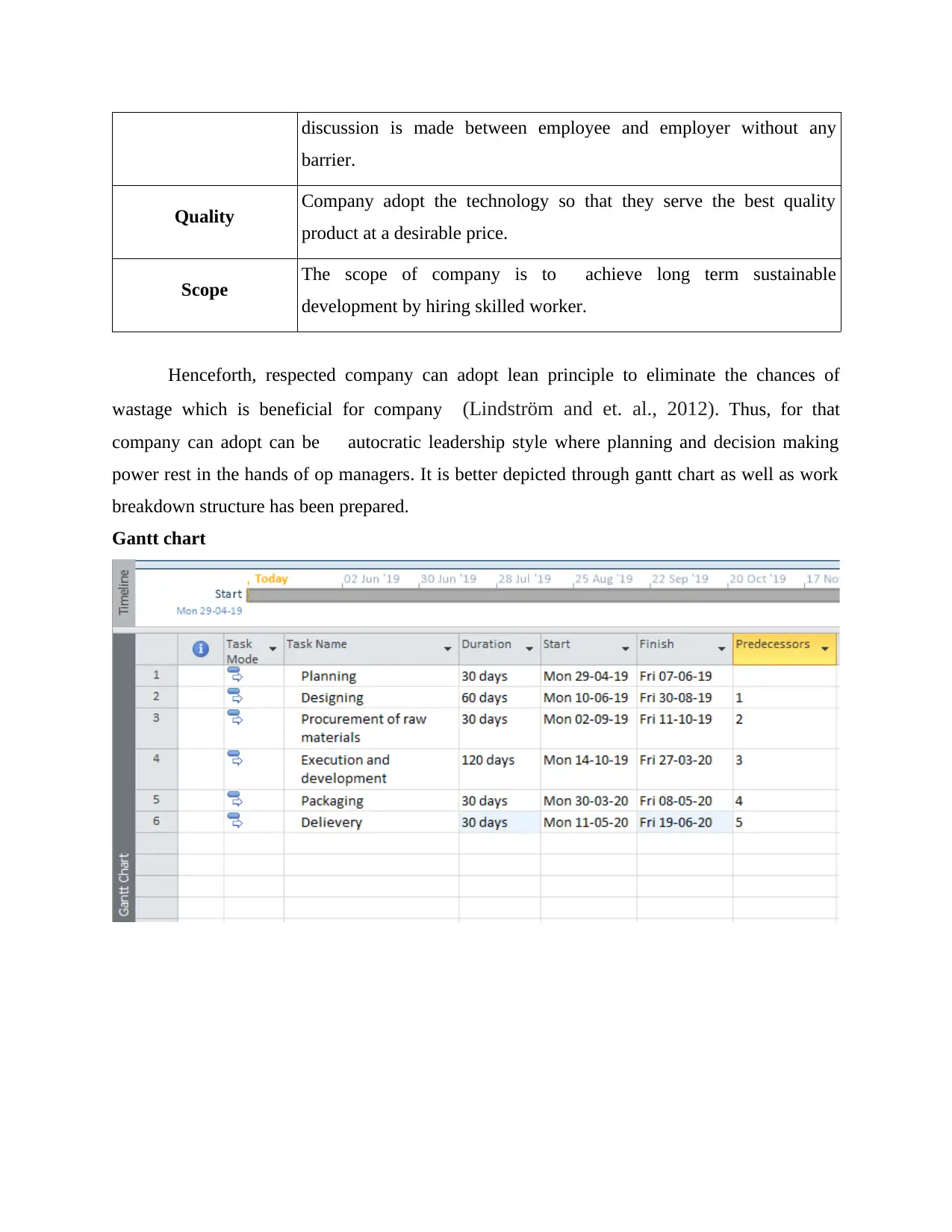
discussion is made between employee and employer without any
barrier.
Quality Company adopt the technology so that they serve the best quality
product at a desirable price.
Scope The scope of company is to achieve long term sustainable
development by hiring skilled worker.
Henceforth, respected company can adopt lean principle to eliminate the chances of
wastage which is beneficial for company (Lindström and et. al., 2012). Thus, for that
company can adopt can be autocratic leadership style where planning and decision making
power rest in the hands of op managers. It is better depicted through gantt chart as well as work
breakdown structure has been prepared.
Gantt chart
barrier.
Quality Company adopt the technology so that they serve the best quality
product at a desirable price.
Scope The scope of company is to achieve long term sustainable
development by hiring skilled worker.
Henceforth, respected company can adopt lean principle to eliminate the chances of
wastage which is beneficial for company (Lindström and et. al., 2012). Thus, for that
company can adopt can be autocratic leadership style where planning and decision making
power rest in the hands of op managers. It is better depicted through gantt chart as well as work
breakdown structure has been prepared.
Gantt chart
Paraphrase This Document
Need a fresh take? Get an instant paraphrase of this document with our AI Paraphraser
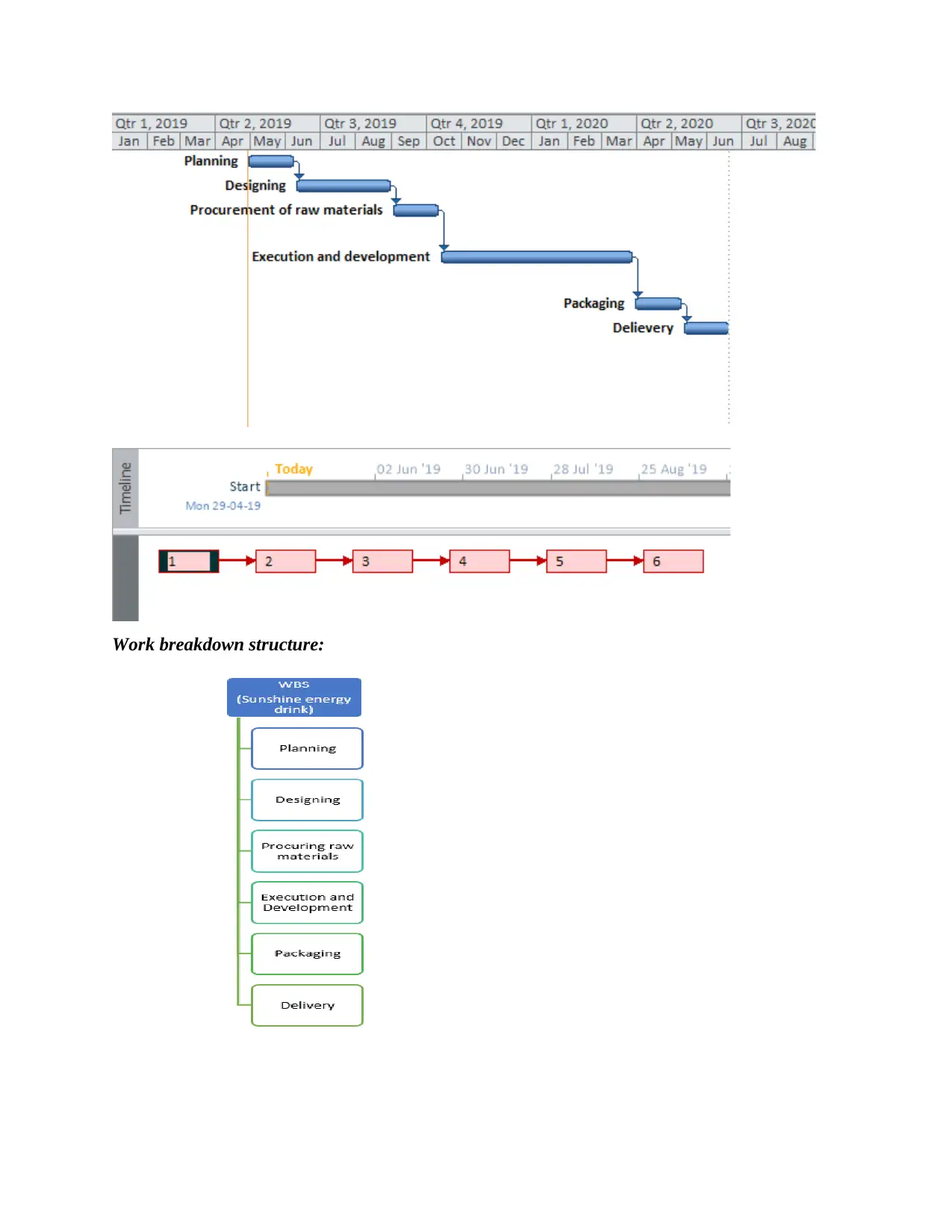
Work breakdown structure:
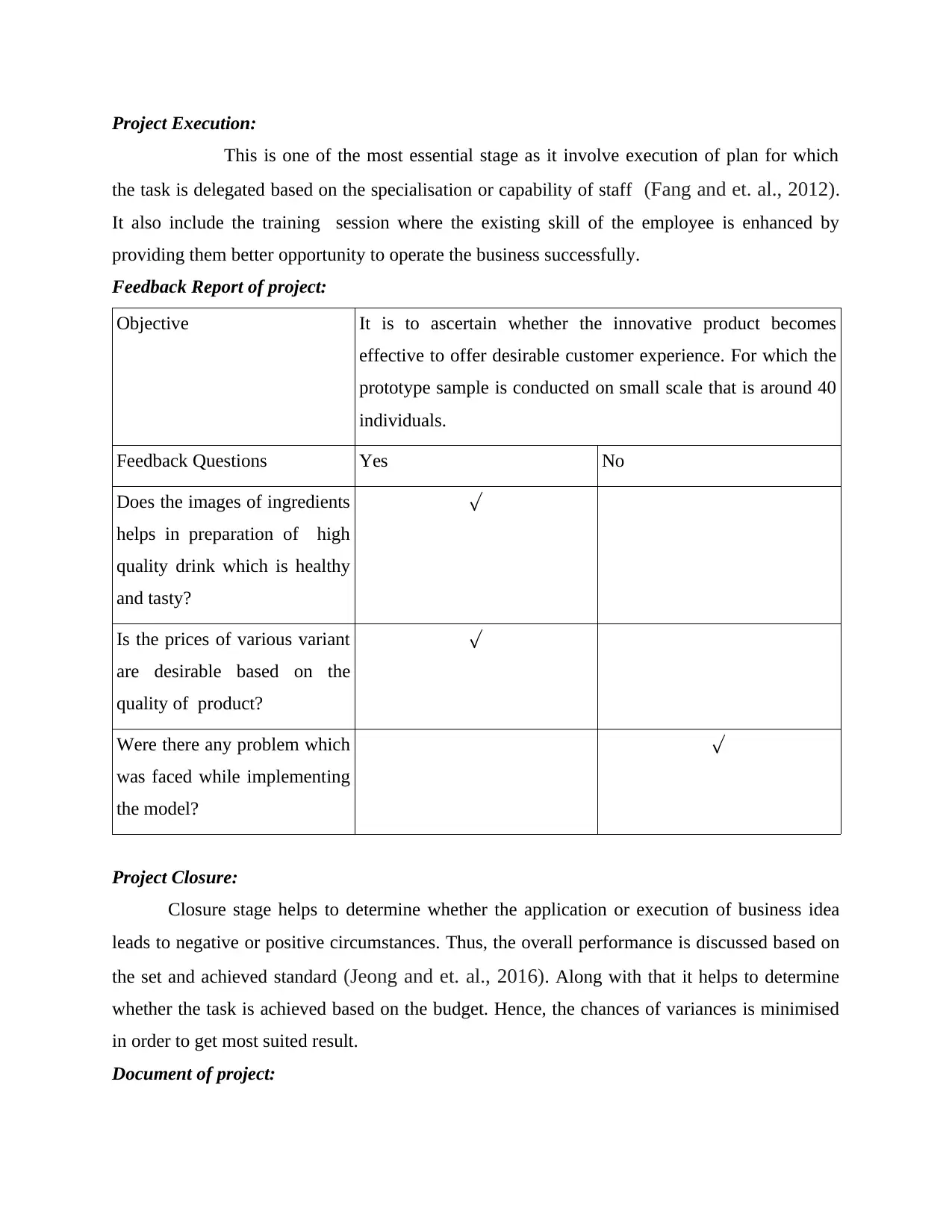
Project Execution:
This is one of the most essential stage as it involve execution of plan for which
the task is delegated based on the specialisation or capability of staff (Fang and et. al., 2012).
It also include the training session where the existing skill of the employee is enhanced by
providing them better opportunity to operate the business successfully.
Feedback Report of project:
Objective It is to ascertain whether the innovative product becomes
effective to offer desirable customer experience. For which the
prototype sample is conducted on small scale that is around 40
individuals.
Feedback Questions Yes No
Does the images of ingredients
helps in preparation of high
quality drink which is healthy
and tasty?
✓
Is the prices of various variant
are desirable based on the
quality of product?
✓
Were there any problem which
was faced while implementing
the model?
✓
Project Closure:
Closure stage helps to determine whether the application or execution of business idea
leads to negative or positive circumstances. Thus, the overall performance is discussed based on
the set and achieved standard (Jeong and et. al., 2016). Along with that it helps to determine
whether the task is achieved based on the budget. Hence, the chances of variances is minimised
in order to get most suited result.
Document of project:
This is one of the most essential stage as it involve execution of plan for which
the task is delegated based on the specialisation or capability of staff (Fang and et. al., 2012).
It also include the training session where the existing skill of the employee is enhanced by
providing them better opportunity to operate the business successfully.
Feedback Report of project:
Objective It is to ascertain whether the innovative product becomes
effective to offer desirable customer experience. For which the
prototype sample is conducted on small scale that is around 40
individuals.
Feedback Questions Yes No
Does the images of ingredients
helps in preparation of high
quality drink which is healthy
and tasty?
✓
Is the prices of various variant
are desirable based on the
quality of product?
✓
Were there any problem which
was faced while implementing
the model?
✓
Project Closure:
Closure stage helps to determine whether the application or execution of business idea
leads to negative or positive circumstances. Thus, the overall performance is discussed based on
the set and achieved standard (Jeong and et. al., 2016). Along with that it helps to determine
whether the task is achieved based on the budget. Hence, the chances of variances is minimised
in order to get most suited result.
Document of project:
⊘ This is a preview!⊘
Do you want full access?
Subscribe today to unlock all pages.

Trusted by 1+ million students worldwide
1 out of 16
Related Documents
Your All-in-One AI-Powered Toolkit for Academic Success.
+13062052269
info@desklib.com
Available 24*7 on WhatsApp / Email
![[object Object]](/_next/static/media/star-bottom.7253800d.svg)
Unlock your academic potential
Copyright © 2020–2026 A2Z Services. All Rights Reserved. Developed and managed by ZUCOL.




